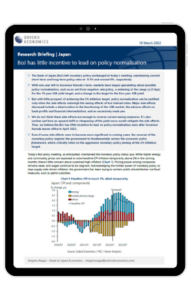Research Briefing
| Mar 18, 2022
BoJ has little incentive to lead on policy normalisation

Today’s BoJ policy meeting, as anticipated, maintained the monetary policy status quo. While higher energy and commodity prices are expected to raise headline CPI inflation temporarily above 2% in the coming months, there’s little concern about sustained high inflation. Pricing power among companies remains weak, and wages continue to be stagnant. Acknowledging the limited power of monetary policy to stop supply-side-driven inflation, the government has been trying to contain public dissatisfaction via fiscal measures, such as petrol subsidies.
What you will learn:
- With one year left to Governor Kuroda’s term, markets have begun speculating about possible policy normalisation, such as an exit from negative rate policy, a widening of the range (±25 bps) for the 10-year JGB yield target, and a change in the target to the five-year JGB yield.
- But with little prospect of achieving the 2% inflation target, policy normalisation can be justified only when the side effects outweigh the easing effects of low interest rates. Major side effects discussed include a deterioration in the functioning of the JGB market, the adverse effects on bank profits and financial intermediation, and an excessively weak yen.
- We do not think these side effects are enough to reverse current easing measures. It’s also unclear just how an upward shift or steepening of the yield curve would mitigate the side effects. Thus, we believe the BoJ has little incentive to lead on policy normalisation even after Governor Kuroda leaves office in April 2023.
Tags:
Related services


Service
Global Macro Strategy Service
Global insight and opportunity at your fingertips.
Find Out More